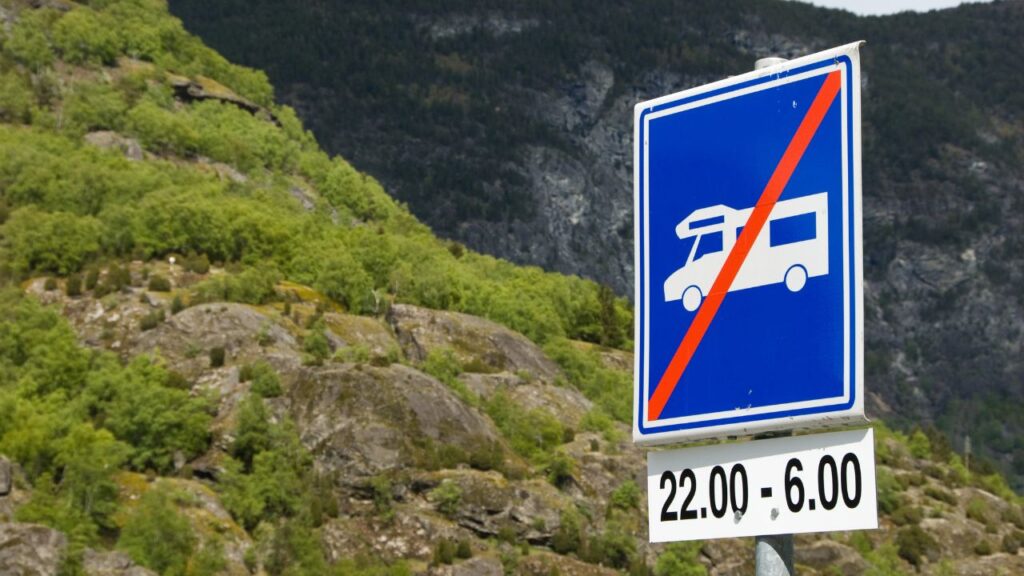Sleeping in a motorhome is a mesmerising experience that allows you to directly experience nature. However, questions inevitably arise about safety, legality and the best places to spend the night. In this article, we answer the most frequently asked questions so that you can enjoy your motorhome trip with complete peace of mind. Read on and get ready for an unforgettable adventure!
Where can you sleep in a motorhome?
As a motorhome is so versatile, it allows you to choose between different types of places to spend the night. However, it is important to know that not all sites are approved for sleeping, and complying with regulations is essential to avoid problems.
- Motorhome service areas: specifically designed for motorhomes, they generally offer services such as water, electricity and waste water disposal areas. They are convenient places, ideal for a carefree overnight stay without the need for special permits.
- Camping Sites: an excellent option, especially if you are looking for complete facilities. They usually offer showers, toilets, recreational areas and security, providing a safe environment for overnight stays.
- Permitted parking areas: motorhomes are allowed to stay overnight in many towns and villages. However, check local regulations to make sure this is permitted. It is important to remember that, in many places, sleeping inside the motorhome is allowed as long as no external elements such as chairs or tables are erected, otherwise this would be considered camping.
- Rural areas and natural surroundings: if you prefer to enjoy the peacefulness of nature, sleeping in rural areas is a great option. However, in Spain, camping in natural areas may be restricted in many regions, especially in natural parks or protected areas. Before setting up camp, find out about the regulations in the area to avoid fines or problems.
Is it safe to sleep in a motorhome?
Safety is one of the main concerns when sleeping in a motorhome. However, by taking a few precautions and choosing the right places, you can rest easy.
- Choose a safe place: opt for well-lit areas with some traffic, especially if you're in an urban environment. In rural environments, make sure you park on firm ground and away from areas with natural hazards, such as cliffs or rivers where there could be potential flooding.
- Motorhome safety systemsIf your motorhome does not have an alarm system, consider installing one. Also, weigh up additional locks for doors and windows.
- Keep personal belongings out of sight: to avoid attracting unwanted attention, store valuables out of sight. There are portable safes that you can take with you to keep your important documents or cash secure.
- Get to know your surroundings: familiarise yourself with the surroundings where you plan to spend the night. Map apps and the opinions of other users on social media can give you information about the safety of a place. It is also useful to identify the location of nearby emergency services.
With these precautions, sleeping in a motorhome can be very safe, allowing you to enjoy every night with the peace of mind you need to make the most of your trip.

When is it legal to stay overnight?
One of the most important aspects of planning an overnight stay in a motorhome is to be aware of legal regulations. Overnight stay laws can vary from country to country and town to town, so it is essential to be informed in order to comply with the regulations and avoid possible fines.
- Overnight stays versus campingIn Spain, the difference between an overnight stay and camping is key. Overnight stays are allowed in most places, as long as you only use the motorhome for sleeping and do not erect external elements such as chairs, tables or unfold the awning. The latter would be considered camping. If you want to be able to camp in peace and quiet, there are applications such as“Park4night” that will help you find motorhome areas according to your location.
- Restrictions in protected areas: overnight stays may be limited or prohibited in natural parks and protected areas. These restrictions are intended to protect the natural environment and preserve local flora and fauna. Be sure to check local regulations before staying overnight in these places, as fines can be high.
Local regulations in cities and towns: each autonomous community and municipality may establish its own regulations regarding overnight stays in motorhomes. In some locations, it is common to find car parks set up specifically for this purpose, while in others, it is forbidden to spend the night in certain areas. It is best to check local regulations or visit tourist information points.
Additional tips for a safe night's sleep in your motorhome
Here are some additional tips to ensure a safe and comfortable experience:
- Plan your route: knowing where you plan to spend the night before you leave is good practice. This will help you to choose safe and secure sites and avoid last-minute surprises.
- Maintain your motorhome in good condition: check the battery, water and gas levels before you go to sleep, to make sure you have what you need for the night. Also, keep safety items such as a fire extinguisher and a torch handy.
- Respect the environment: avoid leaving litter behind whether you sleep in a city or in the countryside. The experience of travelling in a motorhome is even more enriching when it is done in a sustainable, respectful way.
In short, Sleeping in a motorhome is safe and legal in most cases, as long as you follow the regulations and choose the right places to spend the night. The key is to obtain information and plan ahead to enjoy this wonderful way of travelling with peace of mind.
Do you want to take the plunge? Check out the options for Benimar motorhomes and get ready to discover the world in freedom and comfort.
